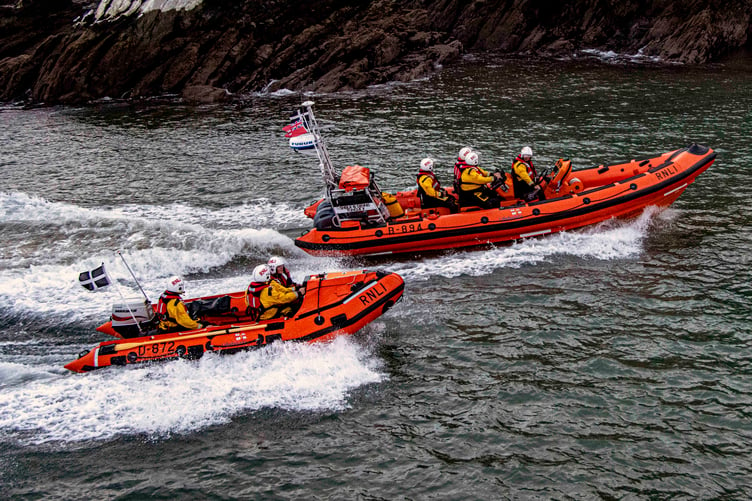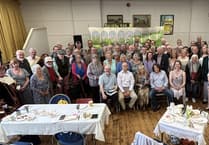THE RNLI is celebrating 200 years of saving lives at sea today (March 4) – thanks has been given to its volunteers, like those at Looe lifeboat station, for giving their time to save others.
The RNLI has revealed that its lifeboat crews and lifeguards have saved 146,277 lives during its two centuries of lifesaving.
In celebration, a service of thanksgiving to mark the 200 years will take place at Westminster Abbey in London.
It will be attended by representatives from RNLI lifesaving communities around the UK and Ireland, including Looe RNLI’s lifeboat operations manager David Haines, inshore lifeboat helm David Jackman, lifeboat press officer Ian Foster, lifeboat visits officer Carol Foster, volunteer shop manager Sue Bungey and her assistant Patricia Calloway.
Brothers, Charlie and Beau Gillett, senior lifeguard supervisors with the RNLI’s South East Cornwall lifeguard team will also be in attendance.
Looe RNLI lifeboat station was founded in 1866 and closed in 1930, only to be re-established as an inshore lifeboat station on June 15, 1992. Between 1866 and 1930 its crews have launched the three wooden row/sail lifeboats 31 times saving 74 lives and, since 1992, volunteer crews have launched 1,004 times saving 65 lives. Cumulanatively the station’s volunteers have launched the lifeboats 1,035 times, saving 139 lives.
Looe RNLI lifeboat station’s press officer, Ian Foster, said: “It is an honour for us to be asked to represent the community of Looe and the station’s current and former crews at the Westminster Abbey, service of thanksgiving.
“Looe RNLI volunteers have been saving lives along the South East Cornish coastline between 1866 and 1930, when the station was closed. Since 1992 crews have been operating the charity’s modern D Class inshore lifeboat, joined by an Atlantic B Class inshore lifeboat since 2003. They are the latest generation to carry forward this lifesaving work.
“Lifeboating has been carried out by many generations before us, and will be, by many generations to come. Two of our latest volunteer crew Amber Palfrey and Will Jaycock have relatives in the crew, Amber’s father, Clive, and Will’s uncle, Matt, are both senior helms at the station and Amber’s uncle, Del is a volunteer tractor driver.
“Our volunteer boat crews are supported by a small ‘army’ of shop volunteers, boathouse guides and fundraisers. Whilst we don’t have plans for a birthday celebration, preparations by the Looe Boat Owners Association are well underway for the annual Looe raft race on June 16, 2024, which raises valuable funds for the station.
“Our souvenir shop is open daily where you can purchase specially branded RNLI200 products as well as our existing range of clothing, gifts, cards and calendars. From Easter our boathouse guides will be opening the boathouse daily where the public can see the charity’s inshore lifeboats and launch vehicles, learn about our volunteer crews, how to keep safe on the coast or on the water and the work of the RNLI over the last 200 years and the years to come.”
Founded in a London tavern on March 4, 1824 following an appeal from Sir William Hillary, who lived on the Isle of Man and witnessed many shipwrecks, the RNLI has continued saving lives at sea throughout the tests of its history, including tragic disasters, funding challenges and two World Wars.
Two centuries have seen vast developments in the lifeboats and kit used by the charity’s lifesavers – from the early oar-powered vessels to today’s technology-packed boats, which are now built in-house by the charity; and from the rudimentary cork lifejackets of the 1850s to the full protective kit each crew member is now issued with.
The RNLI’s lifesaving reach and remit has also developed over the course of 200 years. Today, it operates 238 lifeboat stations around the UK and Ireland, including four on the River Thames, and has seasonal lifeguards on over 240 lifeguarded beaches around the UK. It designs and builds its own lifeboats and runs domestic and international water safety programmes.
While much has changed in 200 years, two things have remained the same – the charity’s dependence on volunteers, who give their time and commitment to save others, and the voluntary contributions from the public which have funded the service for the past two centuries.
RNLI chief executive, Mark Dowie, added: “It has been an honour and a privilege to be at the helm of the RNLI for the past five years, and to see the charity reach its bicentenary. For a charity to have survived 200 years based on the time and commitment of volunteers, and the sheer generosity of the public donating to fund it, is truly remarkable. It is through the courage and dedication of its incredible people that the RNLI has survived the tests of time, including tragic losses, funding challenges, two World Wars and, more recently, a global pandemic.
“Today, we mark the bicentenary of the RNLI. We remember the achievements and commitment of all those who have been part of the RNLI family over the past two centuries; we celebrate the world-class lifesaving service we provide today, based on our 200 years of learning, expertise and innovation, and we hope to inspire future generations of lifesavers and supporters who will take the RNLI into its next century and beyond.
“I am immensely grateful to everyone who is involved with the charity – our volunteers, supporters and staff. This is our watch and it is our role to keep our charity safe and secure so it can continue to save lives into the future, as we strive in our vision to save every one.”
Throughout its bicentenary year, the charity is running events and activities to remember its important history and celebrate the modern lifesaving service it is today, while hoping to inspire generations of future lifesavers and supporters.
For further information about the RNLI’s 200th anniversary, visit RNLI.org/200.





Comments
This article has no comments yet. Be the first to leave a comment.